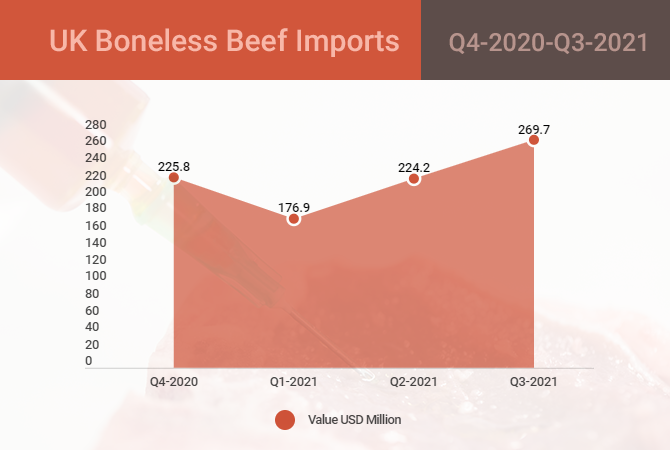In the early trade negotiations to be conducted between both the regions, the UK is stringent on maintaining its food safety and animal welfare standards. The UK imports about 35% of beef and veal combined annually. Out of approximately 1.5 million tonnes of beef each year, Canada exports around 45% of its produced beef and cattle production.
Canada has urged the UK to lift the hormone-treated beef imports ban. UK’s department for international trade said in a statement recently that Canada cultivates a highly hormone-induced beef. As per the UK’s high food safety standards and animal welfare, trade negotiations with other countries must comply with the UK’s import regulations.
Is UK A Beef Importer or an Exporter?
According to the Agriculture and Horticulture Development Board (AHDB), the UK imports of beef are higher despite the UK’s self-sufficiency on beef of 86%, as per the 2019 figures. In the UK markets, consumer mostly consumes fresh boneless beef. The below graph shows the import trends in the UK for boneless beef for the period ranging from Q4-2020 to Q3-2021.

The United Kingdom produces approximately 900 hundred thousand tonnes of beef annually. Out of this, around 148,000 tonnes of beef is produced to export to other countries. Hence, the imports are higher than the exports for beef in the UK.
Timeline of Hormone Beef
Since the 1950s, the Food and Drug Administration (FDA) approved numerous steroid hormones to inject into beef. In Canada, hormones are used in beef since the 1960s for the growth of muscles in animals rather than fat, and to have an alternative of feedstock to serve the purpose.
In 1989, the EU banned the importation of hormone beef (and meat in general) which was approved by the FDA in the USA. A study conducted on hormone-treated beef by the Scientific Committee on Veterinary Measures Relating to Public Health (SCVMPH) in 1999, found that one of the six hormones in hormone beef has the potential to cause cancer.
In 2003, the EU ban one of the six hormones named “estradiol” during which the UK was part of the EU and maintained the same standards. With a long-running history of the dispute between the US and EU for hormone beef trade ban, in 2008, WTO allowed beef trade for the US and Canada with allowance to continue the ban by the EU.
UK Beef Imports – By Countries
Beef imports from Ireland count as the highest among its all importing countries for beef, or to be particularly boneless beef. Import data for imports of boneless beef (or generally beef) from Canada to the UK consists of no such significant values, as there is no trade between both countries for the said commodity.
The UK import data 2020 shown below represent the imports of the UK from its partner countries. The highest importing partner for boneless beef in the UK is Ireland with an import value of $662 million, followed by the Netherlands with an export value of $50.7 million, Poland with a value of $40.4 million, Uruguay with $9.1 million, and Portugal with $7.8 million along with other countries.
Political and economic factors pushed the EU’s authorities to take a decision against the use of hormone steroids for imported beef from other countries. While it is said that livestock producers are responsible for maintaining the limited usage of hormones injected into the meat, the UK stands firm on its decision and experts suggest that Canada’s efforts are in vain for now.
Cattle feeding remains the largest expense by the livestock industry in many countries. The use of hormone steroids explains the consideration of alternatives to make cattle gain weight for bigger prices while trading. Perhaps, on a global scale, the safer and cheaper option would be to feed livestock with corn rather than chemically-induced fodder for countries to adopt.




